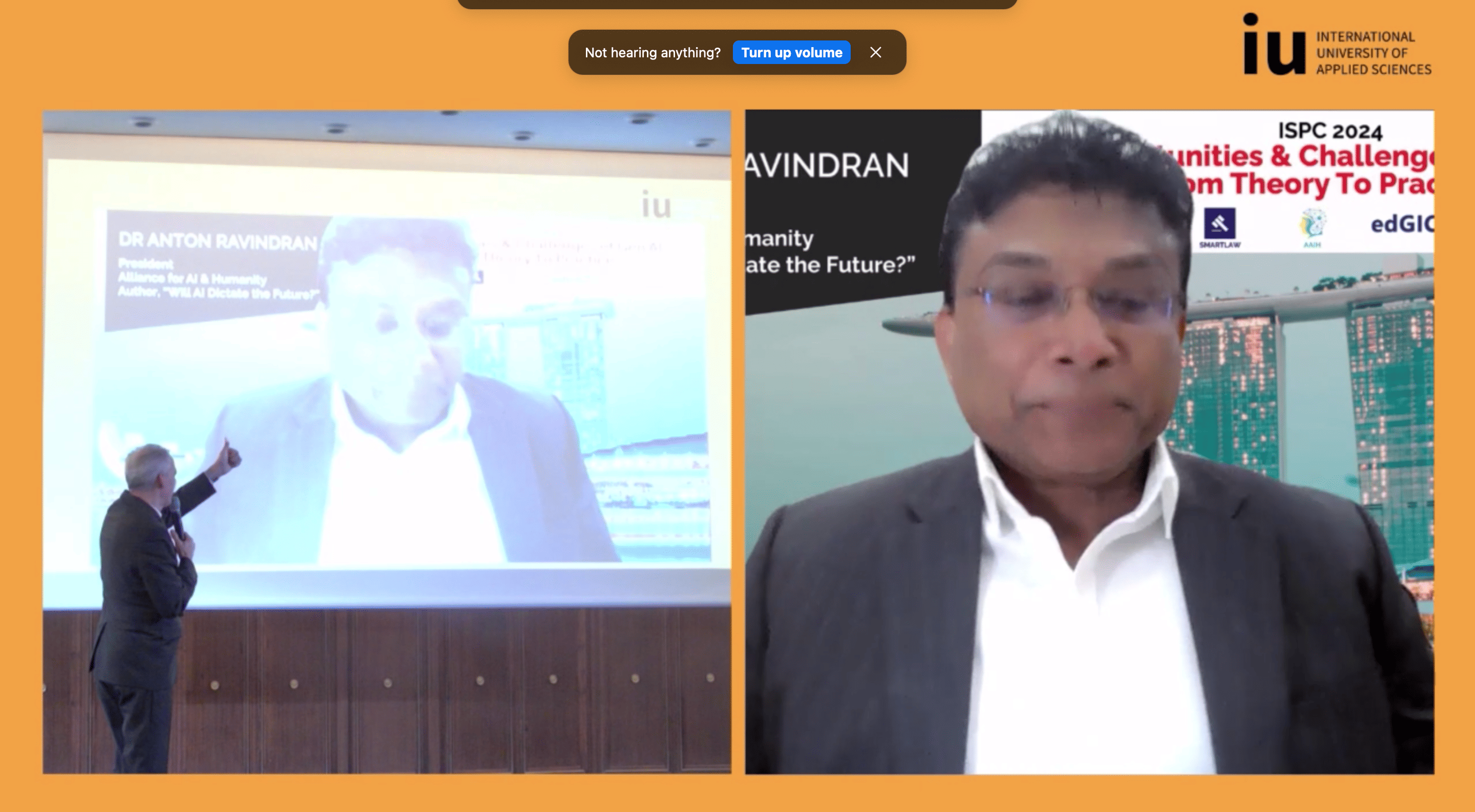Insights from ISPC 2024
The second day of ISPC 2024, held virtually, brought together leading thinkers and researchers to explore the dynamic interplay of Digital Management and Artificial Intelligence (AI). The day was dedicated to a series of scientific presentations and breakout sessions that covered topics such as the societal impacts of AI, sustainability, and industrial applications. One highlight was the keynote by Dr. Anton Ravindran, President of the Alliance for AI & Humanity, who joined the event via Zoom from Singapore.
The Impact of AI on Society: A Revolutionary Force
Dr. Ravindran’s opening speech set the tone for the day, highlighting how rapidly AI is changing our world. Although AI has been part of academic research for over 60 years, the exponential growth of data and computing power has elevated it to a whole new level. Recent advances in Generative AI (GenAI), particularly large language models like ChatGPT, significantly outperform human capabilities in various areas, including programming, mathematics, design, and medical analysis.
Dr. Ravindran explained that these breakthroughs are driven by the vast amounts of data generated through mobile devices and social media, alongside open-source innovations that have made AI development more accessible. He cited key research contributions, such as Geoffrey Hinton’s “ImageNet” paper and the “Attention is All You Need” paper, which introduced transformer models, as instrumental to these advances.

Balancing Innovation and Ethics in AI
Despite the impressive capabilities of Generative AI, Dr. Ravindran also pointed out the ethical challenges posed by AI. Issues such as data bias, algorithmic bias, misinformation, and AI hallucinations—where AI generates incorrect or fabricated information—are growing concerns. He warned that the rise of AI could lead to job displacement, referencing reports from the World Economic Forum predicting the loss of 85 million jobs by 2030. However, he also noted that 97 million new jobs could be created in the same period, although the nature of these jobs remains unclear.
The keynote underscored the urgent need for responsible AI development. Dr. Ravindran called for interdisciplinary collaboration among researchers, governments, and industries to ensure that AI is trustworthy, auditable, fair, and secure. He emphasized that regulatory frameworks must keep pace with AI advancements, noting that laws and policies often lag behind technology.
AI in Action: Seven Breakout Sessions
Following the keynote, Professor Richard Geibel introduced the day’s scientific breakout sessions, which focused on the practical applications of AI across various industries. The sessions included:
1. AI and Sustainability in Business and Education – This session explored how AI can drive sustainable business practices and support educational innovation.
2. Digital Health – The impact of AI in healthcare was discussed, particularly how AI is improving medical diagnostics, patient care, and health management.
3. Digital Transformation and Industry Projects – The integration of AI in transforming industries, from manufacturing to finance, and the challenges of scaling AI-driven initiatives were addressed.
4. Applications of AI – Led by Christian Lucas, this session examined the diverse applications of AI, from image recognition to predictive analytics, offering insights from real-world case studies.
5. Benefits of AI – This session highlighted the advantages AI brings to businesses and society, from efficiency gains to enhanced decision-making capabilities.
Each session provided participants with in-depth insights into the challenges and opportunities AI presents across various fields, helping to deepen the understanding of AI’s evolving role in both business and society.
Looking Ahead: A Future Shaped by AI
The discussions throughout the day made it clear that AI’s potential to transform industries, economies, and societies is vast, but so are the risks. Dr. Ravindran concluded his keynote with a thought-provoking statement: AI is more dangerous than nuclear technology if misused, as it is more accessible and can easily fall into the wrong hands. The need for global cooperation, clear ethical guidelines, and continuous research was emphasized as AI technologies continue to evolve rapidly.
As ISPC 2024 unfolds, the key takeaway is that while AI holds transformative power, its development and implementation must be handled with care, prioritizing human values, ethics, and societal well-being.
Final Thoughts
The second day of ISPC 2024 was a profound exploration of AI’s capabilities and challenges. The presentations and discussions painted a picture of a future where AI plays a central role in shaping industries and societal functions. However, the consensus was clear: we must move forward cautiously to ensure that innovation does not outpace our ability to regulate and understand its impacts.